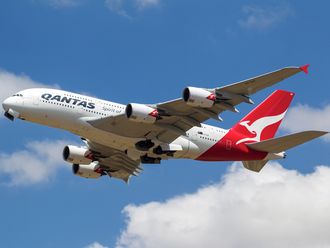
As 2009 began, the world's banks and brokers were in a deep hole. They had recorded some $1 trillion (Dh3.67 trillion) in credit losses and writedowns of their mortgage holdings in the financial crisis of 2007 and 2008, and markets were still reeling. To recapitalise, they issued stock — a lot of it.
More than half of the new shares sold worldwide in the first six months of 2009 were those of banks and brokers. That kept investment bankers busy marketing their own — and each others' — shares, while their clients hunkered down waiting for the storm to pass, Bloomberg Markets reports in its April issue.
The sky cleared in the second half, making 2009 a year of recovery. By year's end, the Standard & Poor's 500 Index had shot up 65 per cent from its March 9 low, which helped trigger a flood of new stock and bond issues and merger activity.
Total investment-banking fees for all firms rose 13 per cent in 2009, to $59.8 billion from $53.1 billion, still well shy of the record $86.9 billion reached in 2007, according to data compiled by Bloomberg Markets for its sixth annual ranking of the best-paid investment banks.
The world's No 1 investment bank in 2009 was JPMorgan Chase & Co, which took in $4.97 billion, a 16 per cent increase over 2008, when it was also the leader. JPMorgan was also No 1 in fees from equity and debt sales. Goldman Sachs Group Inc was No 2 in total fees and No 1 in mergers and acquisitions (M&A), having advised drugmaker Schering-Plough Corp on its completed $47 billion sale to Merck & Co, among other transactions.
"JPMorgan and Goldman Sachs have the field to themselves because they've emerged as the victors, at least in clients' perceptions," says Bruce Foerster, president of Miami-based advisory firm South Beach Capital Markets.
Executives and bankers expect the recovery to gain momentum in 2010.
"All the stars are lined up for a resurgence, but a return of stock market volatility will ruin the party," says Robert Kindler, global head of mergers advice at Morgan Stanley. Kindler's anxiety about the possibility of a big market correction is shared by investment-banking heads at Barclays Plc, Credit Suisse Group AG, UBS AG and Goldman.
The Dow Jones Industrial Average took an 800-point plunge from January 19 to February 8. It has since recovered more than half of the drop. Kindler says that if the markets stabilise, the value of merger deals could rise as much as 20 per cent in 2010. If they don't, M&A volume could decline from last year.
James Amine, Credit Suisse's co-head of investment banking, says he sees a possible 30 per cent jump in the sale of new shares, bonds, syndicated loans and securitisations.
Off the bottom
"Are we off the bottom?" asks David Solomon, global co-head of investment banking at Goldman Sachs. "Yes, it seems that way. Are we heading back to the top this year? While we may not yet be, we saw a lot of activity in capital markets and M&A in the second half of 2009, and that momentum is continuing into 2010."
For the biggest banks, 2009 was a year of humility. In the United States, top executives and millionaire traders were denounced by the Obama administration, Congress and the media for refusing to give up their bonuses.
Goldman spent 2009 defending its role in the 2008 bailout of insurance giant American International Group Inc. The Federal Reserve Bank of New York and its former head, Treasury Secretary Timothy F. Geithner, are being called on to answer questions by Neil Barofsky, special inspector general for the Troubled Asset Relief Programme, for ordering that Goldman and other banks be paid 100 per cent of what they were owed on credit-default swaps they bought from AIG and then concealing the names of the recipients.
While their chief executives spent time testifying in Washington, investment bankers were taking advantage of the resurgence in deals. Morgan Stanley, whose investment-banking fees dropped by more than half in 2008 as questions arose about its viability, made a powerful comeback last year, taking in $4.33 billion in total fees, a 43 per cent increase, although still nowhere near the $6.36 billion it generated in 2007. No 6 Credit Suisse climbed two rungs as its fees surged 29 per cent. No 5 Citigroup, the recipient of the largest government bailout, fell in the rankings for a second year; its $3.86 billion in fees was just a two per cent increase from what it reaped in 2008.
JPMorgan's huge size and deep pockets — it has $2 trillion in assets — allowed it to provide companies with M&A advice and equity and debt underwriting and then lend them the money to do the deals.
"Clients will always look to do business with investment banks that they are confident can provide all these services and the capital they need in good times and bad," says Douglas Braunstein, JPMorgan's investment-banking chief.
Overall, there were fewer merger deals and initial share offerings (IPO) in 2009 than the year before, and it will be years, bankers predict, before they match the peak of 2007. The drop in M&A and initial public offerings was offset by a surge in bond and secondary stock sales. Bond markets fared well when corporations shut off from direct bank lending turned to debt issuance. Stock sales jumped as both financial and non-financial companies used share sales to recapitalise.
The largest banks face other head winds besides skittish markets. Government-enforced pay caps on the biggest earners at commercial and investment banks could accelerate a brain drain to smaller firms that has been under way for more than two years. If the Federal Reserve raises interest rates to ward off inflation, that could crimp economic growth and raise the cost of financing acquisitions and the issuance of new debt.
Equity vs M&A
The merger market remained in a slump in 2009. For the first time in the six years since Bloomberg began tracking fees in 2004, banks made more money in equity-underwriting deals than they did by arranging acquisitions: $21.7 billion versus $19.3 billion.
The year was marked by two stages, says Purna Saggurti, global co-head of corporate and investment banking at Bank of America Merrill Lynch, which ranks No 4 in the Bloomberg 20, with $4 billion in fees, and No 5 in merger fees.
The first few months were about survival, as credit dried up, share prices languished and bankruptcies surged, he says.
With the turnaround of markets in April after the S&P 500 hit a 13-year low of 677 in March, the mood shifted. As the year progressed, corporations, led by financial institutions, were able to recapitalise by selling stock to someone other than the government. Only at the very end of 2009 and the beginning of 2010 did industrial and other companies turn their gaze toward expansion opportunities, Saggurti says.
Given the slow growth in developed economies — expected to be 2.1 per cent this year, according to the International Monetary Fund — acquisitions will be the chief strategy for companies looking for a way to boost revenue, says Peter J. Solomon of New York-based investment-banking boutique Peter J. Solomon Co.
"Companies that have survived the debacle have to figure out what they can do to increase market share, and that's when acquisitions come into play," Solomon says.
Private-equity firms, a major source of investment bank revenue in the past decade, are no longer the big players in the M&A market. In 2007, private-equity transactions made up 19 per cent of all merger activity, according to Bloomberg data. Last year, they accounted for five per cent. A recovery to 2007 levels might take as long as five years, Morgan Stanley's Kindler says.
Still, there's a clear revival in the ability of outfits such as Blackstone Group LP and KKR & Co to buy and sell companies.
"We shouldn't write off private equity," Saggurti says. "Maybe we won't have $40 billion deals, but they'll still pull off $5 billion to $10 billion deals. They just can't be as competitive for the big deals."
The overall investment-banking market's recovery has been fuelled by CEOs who now see a future for their businesses and by investors who have regained their appetite for risk, bankers say. JPMorgan's Braunstein says the renewed confidence will show itself in a spate of new IPOs. Among the largest will be share sales of government-controlled companies in emerging markets, says Raj Dhanda, head of global capital markets at Morgan Stanley. Beijing-based Agricultural Bank of China plans an IPO this year that could raise $29 billion, an official at the China Banking Regulatory Commission says. Poland may raise $10 billion from selling stakes of state-owned companies, including Warsaw-based PZU SA, the country's biggest insurer.
Debt markets followed the same pattern as equities and M&A in 2009. In the first half, there was demand only for investment-grade securities from the largest corporations. The lucrative market for new high-yield corporate issues was close to dead. Junk bonds made a strong comeback in the second half, surging to a record, as appetite for risk started to return. That trend is continuing in 2010, Dhanda says.
Structured products, including collateralised-debt obligations (CDO) — bundles of subprime mortgage loans and other debt — made up almost 40 per cent of all debt issued in 2006. In 2009, they accounted for 10 per cent.
"That market is back, but not in the same way," says Hugh "Skip" McGee, Barclays Capital's head of global investment banking. "So we'll see far fewer esoteric CDOs. Plain vanilla securitisation of car loans and credit-card debt is what is back."
In January, Wells Fargo & Co arranged a $275-million CDO backed by commercial loans, a sign of thawing markets.
Yet all this progress could come to a quick end if the global economy suffers a new shock that results in heavy market losses. It's already been shaken by market dips in January and February that were triggered when China ordered its banks to tighten lending standards and US President Barack Obama called for limits on risk taking by banks.
Growing anxiety about the debt woes of EU countries including Greece, Ireland, Portugal and Spain added to the jitters.
As of last week, it looked like the European Union would come to the aid of Greece, which disclosed in October it was running up a budget deficit of more than 12 per cent of gross domestic product.
"Capital markets and merger activity go hand in hand with economic growth," says David Hendler, head of US financial services research at Credit-Sights Inc. "So as China tries to cool off and western economies recover slowly, those activities cannot surge. And if there's an economic or market dip, then the expectations of 10 to 20 per cent expansion in investment banking won't be attainable either."
A heavy market sell-off would hit the prospects first for new IPOs and then mergers, McGee says. Firms that are selling shares for the first time are more sensitive to market levels as they try to maximise what they can raise, bankers say. While strong companies looking to buy competitors for strategic reasons pay less attention to stock price gyrations, a sharp reduction in their market value makes all-stock deals less appealing to both sides.
"Great stories will still get done, but some on the margins will be halted," McGee says.
McGee used to be in charge of investment banking at Lehman Brothers Holdings Inc, whose September 2008 bankruptcy resounded around the world. Barclays bought Lehman's US operations. Lehman was No 9 in the 2007 Bloomberg 20 ranking, while Barclays, the UK's second-largest bank by market value, was 18th. The combination helped Barclays move up to Lehman's No 9 spot in 2009.
Like JPMorgan, Barclays attracts clients with its big store of assets: $2.5 trillion. When Pfizer Inc was bidding to take over Wyeth, five banks advising the acquirer had to commit $4.5 billion each for financing. Lehman couldn't have done that, McGee says. Barclays could, thanks to the fact that its balance sheet is triple the size that Lehman's was.
No bank that's still operating has fallen farther in the investment-banking pantheon than Citigroup, which was No 1 in the Bloomberg 20 ranking from 2004 through 2007 and fell to No 2 in 2008. It's now No 5. The $3.86 billion in total fees it captured in 2009 is a little more than half of the record $6.88 billion it garnered in 2007.
Citigroup took a $45 billion bailout from the government's Troubled Asset Relief Programme, $20 billion of which it has paid back. The US Government owns 27 per cent of Citigroup shares, which dropped more than 90 per cent in the last 30 months. The bank lost $7.6 billion in the fourth quarter of 2009.
"Citi will carry the burden the longest," South Beach Capital's Foerster says. "Their reputation has been the most battered, and no glue is left to hold the employees together."
Lost market share
Bank of America Corp has also lost market share despite its takeover of Merrill Lynch & Co. In 2007, the two banks' combined portion of the M&A market was 23 per cent. Last year, the merged entity managed just 16 per cent. Similar losses occurred in debt and equity underwriting.
"Integration can take five to 10 years, and that's going to be a drag on Bank of America," Foerster says.
UBS has also fallen back. The Zurich-based bank lost $57 billion on investments tied to the US mortgage market, the biggest amount among European banks, and received a 6 billion Swiss franc (Dh21 billion) capital injection from the Swiss Government. Its 2008 net loss of 21 billion francs was the biggest in the country's corporate history. UBS's $2.5 billion in total 2009 fees represents a 20 per cent drop from 2008. The bank fell four places in the Bloomberg 20 to No 8.
James Neissa, co-head of investment banking at UBS, says the bank, which in 2000 bought US brokerage Paine Webber Group Inc, lost some clients because they doubted its viability.
Now that it has put its losses and other troubles behind it, Neissa says, UBS can use its balance sheet again to back its investment bankers.
"We'll be allocating more of our capital to creating long-term revenue streams," he says. "And frankly, the buyout market is one perfect way of doing that. We'll participate in that market more than before."
As the big banks adjust to the "new normal," they've watched a steady stream of their clients take their business to boutique firms. There were 601 firms that made a fee from M&A advice in 2001; last year, that number rose to 921.
The top 10 banks in the Bloomberg 20 have seen their portion of the merger market dwindle in the past nine years to 64 per cent from 74 per cent, according to Bloomberg data. The top 10's share of stock underwriting has dropped to 72 per cent from 80 per cent. Their piece of the bond market fell to 51 per cent from 64 per cent.
The bankers themselves have followed the business to the smaller firms, some of them among the 275,000 employees the 20 largest banks have let go since 2007, according to Bloomberg data. Political pressure to reduce high-paid bankers' compensation has helped the boutiques lure some new hires, Solomon says. He increased Peter J. Solomon's banker rolls by 41 per cent in 2009 as a result of such opportunities, he says.
"Sectors such as M&A advisory don't require significant capital, and bankers may find working for a financial boutique more attractive," Sanford C. Bernstein & Co analyst Brad Hintz says.
The big banks are doing their best to defend their turf.
"We provide holistic solutions for our clients, ranging from advisory services to capital raising, to financing," Bank of America's Saggurti says. "Most boutiques can't compete with that."
There's no escaping that the carnage of the past three years has shrunk banks' fees along with their balance sheets. Investment banks emerged from their last slump in 2002 to 2003 and rallied into four years of spectacular growth. No one is predicting that kind of rebound this time. The big banks are taking it one year at a time.












